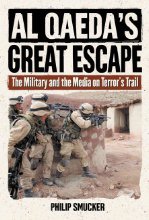Al Qaeda’s Great Escape – Book Review
 Al Qaeda’s Great Escape
Al Qaeda’s Great Escape
Philip Smucker
Brassey’s, 2004
In this book, the author tries – with varying degrees of success – to document the course of events in Afghanistan, and in the contiguous border region of Pakistan, in the months after 9/11. A fourteen year veteran of war reporting, he voices the end of his fascination with war stories – the nightmares of Burma, Cambodia, and the Balkans, and settles down with his wife Cairo. That is until 9/11, when his employers call upon him to once again enter the war zone, in Afghanistan this time.
Smucker tells of his fascination to be treading the same ground as one of his heroes, Winston Churchill. In the way of panegyrics, he quotes a passage, at the start of each chapter from Churchill’s The Story of the Malakand Field Force: An Episode of Frontier War, Churchill’s account of one of England’s "punitive campaigns" in the region, in 1897. Perhaps the only person vying with Churchill for Smucker’s admiration was Geraldo Rivera, the tabloid reporter and erstwhile talk-show host, who made an appearance to try to grab a few more headlines for himself.
{default}The author tells the tale of a legion of journalists descending on Peshawar, Pakistan, on the frontier with Afghanistan, all waiting for the Taliban to self-destruct. He matter-of-factly reveals the mission he will pursue – to hunt down and interview one Osama bin Laden. Rather flippantly, he also tells the tale of how he and Mashal, his interpreter (fluent in five languages), will take down bin Laden with only an empty whiskey bottle and an 8′ x8′ piece of carpet, and claim the $25 million reward.
Upon arriving in Jalalabad, Afghanistan, in early November, he soon realizes that, despite the seizure of Kabul, Kandahar and a considerable portion of the western side of Afghanistan by US forces and the Northernm Alliance, the Taliban and al-Qaeda are yet a force in eastern Afghanistan, especially in Jalalabad. The murder of four western journalists who ran into a Taliban patrol on the Jalalabad-Kabul road is an ominous exclamation point of just how dangerous Afghanistan is.
After settling in, Smucker begins to observe and analyse the actions around Americans, Afghans, al-Qaeda, and foreign Muslims. His most striking observations are of the US presence, the apparent lack of vision, proper planning and, most ominously, the intelligence preparation of the the battlefield (IPB). These failures result in the mass migration of al-Qaeda, Taliban and others – first into Tora Bora and later into Pakistan. Additionally, IPB failures in the Shah-i-Kot region result in US troops being heli-dropped into an area under the gun of at least two al-Qaeda forces, resulting in their being pinned down for the better part of a day. Far from actually indicting the US comamnd structure, Smucker rather points out certain shortcomings and indicates the consequences of such. All in all, he almost seems to wish better results for US forces, and suffers along with them when they fail.
Al Qaeda’s Great Escape is a noble effort at making sense of the Afghan conflict. However, most of the operational content is the result of second-hand knowledge – his interpreter conducts the great majority of interviews with Taliban, al-Qaeda and tribal leaders and fighters. He seems awkward with military equipment and terminology, despite some apparent knowledge of tactics and doctrine. Overall, the book is very ordinary, and would have benefitted from more on-the-scene reporting.

